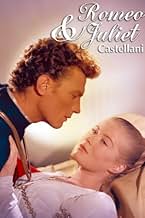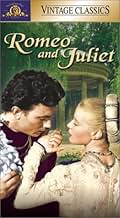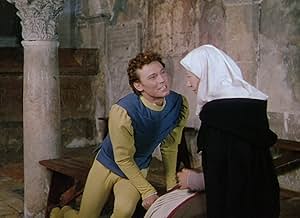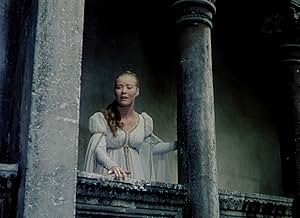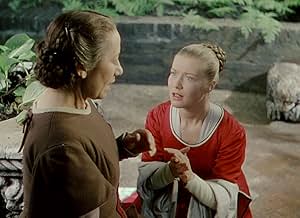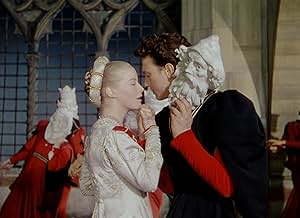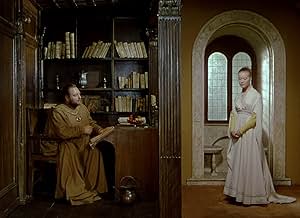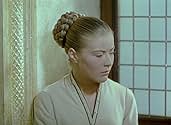अपनी भाषा में प्लॉट जोड़ेंIn Shakespeare's classic play, the Montagues and Capulets, two families of Renaissance Italy, have hated each other for years, but the son of one family and the daughter of the other fall de... सभी पढ़ेंIn Shakespeare's classic play, the Montagues and Capulets, two families of Renaissance Italy, have hated each other for years, but the son of one family and the daughter of the other fall desperately in love and secretly marry.In Shakespeare's classic play, the Montagues and Capulets, two families of Renaissance Italy, have hated each other for years, but the son of one family and the daughter of the other fall desperately in love and secretly marry.
- 3 BAFTA अवार्ड के लिए नामांकित
- 6 जीत और कुल 6 नामांकन
Ennio Flaiano
- Prince of Verona
- (as Giovanni Rota)
Thomas Nicholls
- Brother Giovanni
- (as Tom Nicholls)
कहानी
क्या आपको पता है
- ट्रिवियाDame Joan Collins was originally slated to play Juliet, but turned it down when Writer and Director Renato Castellani insisted she undergo surgery to change the shape of her nose.
- कनेक्शनReferenced in Arena: All the World's a Screen - Shakespeare on Film (2016)
फीचर्ड रिव्यू
Renato Castellani's ROMEO AND JULIET has somehow fallen into a hole in film history. Despite a handsome production with some worthy performances, it is overshadowed by Franco Zefferelli's 1966 film and even the 1936 MGM movie with Norma Shearer, Leslie Howard, Basil Rathbone, and John Barrymore. One has to wonder why - it was the first version of the movie to be shot (or partially shot) on locale in Italy in color. While the leads are not the proper juveniles that appeared in the 1966 version, Lawrence Harvey and Susan Shentell were closer to the ages of the characters than Howard and Shearer were.
My guess is that it's very reliance on Italian movie production may have been a drawback to the audiences who (unfortunately) counted the most: English - speaking ones. The leads were all English and the basic play (despite the Italian setting) was in English by the greatest writer of the English language. If it had been filmed in England I suspect it would have had more acceptance. But this is a guess. There could have been other factors: bad timing due to more overpowering productions. Orson Welles' had completed and released OTHELLO in 1952 (where it, like this ROMEO AND JULIET, won a prize at the Venice Film Festival). The following year Lawrence Olivier's masterly RICHARD III was released. The failure of the Castellani movie remains striking and puzzling.
Today Zefferelli's version is considered the best one by most viewers, because of his making his hero and heroine what they are: growing teenagers. But one should not sneer at Harvey's attempts at Romeo opposite Shentell's Juliet. They do generate a soft glow between them that gradually picks up heat. I might add that I found Shentell's final suicide rather stark and complete as it should be. Whether due to her acting or the director's direction she gave Juliet's passing a type of dignity I have rarely seen.
As for the performers in the cast, Sebastian Cabot's Capulet is the picture of an Italian Renaissance merchant prince type, corpulent and ruthless towards his family's foes. It's funny thinking of Cabot today as a villain in his roles, but in fact (prior to his going into CHECKMATE on television - where he was the wise spy master of the heroes) most of his film parts were villainous, or (as in THE TIME MACHINE) ridiculously self-important. His belated affability appeared only when he lucked out and became "Mr. French" in FAMILY AFFAIR. So here, a 1954 audience in the know, would have had no problem about his rattlesnake - eyed timing in planning the demise of Montagues. Look at his scene at the ball he is throwing when Tybalt (Enzo Fiormonte) wants to kill Romeo, but Cabot restrains him - adding that it can be done later.
Also note Mervyn Johns as Friar Lawrence, who manages to show the all-to-human side of the good man, which enables so many bad things to occur because of his trusting the wrong people (one messenger is locked up because he is stuck in a quarantined house), or his instructions were not clear enough. Johns was a gifted actor in his own way. Most people remember him as gentle, loving Bob Crachit opposite crusty, nasty Scrooge (Alistair Sim). But he was also the bedeviled and doomed architect in DEAD OF NIGHT, and the equally doomed partner of the ruthless Spencer Tracy in EDWARD MY SON. Johns was a fine character role player, and was lucky to pass on his skills to his daughter Glynnis.
My guess is that it's very reliance on Italian movie production may have been a drawback to the audiences who (unfortunately) counted the most: English - speaking ones. The leads were all English and the basic play (despite the Italian setting) was in English by the greatest writer of the English language. If it had been filmed in England I suspect it would have had more acceptance. But this is a guess. There could have been other factors: bad timing due to more overpowering productions. Orson Welles' had completed and released OTHELLO in 1952 (where it, like this ROMEO AND JULIET, won a prize at the Venice Film Festival). The following year Lawrence Olivier's masterly RICHARD III was released. The failure of the Castellani movie remains striking and puzzling.
Today Zefferelli's version is considered the best one by most viewers, because of his making his hero and heroine what they are: growing teenagers. But one should not sneer at Harvey's attempts at Romeo opposite Shentell's Juliet. They do generate a soft glow between them that gradually picks up heat. I might add that I found Shentell's final suicide rather stark and complete as it should be. Whether due to her acting or the director's direction she gave Juliet's passing a type of dignity I have rarely seen.
As for the performers in the cast, Sebastian Cabot's Capulet is the picture of an Italian Renaissance merchant prince type, corpulent and ruthless towards his family's foes. It's funny thinking of Cabot today as a villain in his roles, but in fact (prior to his going into CHECKMATE on television - where he was the wise spy master of the heroes) most of his film parts were villainous, or (as in THE TIME MACHINE) ridiculously self-important. His belated affability appeared only when he lucked out and became "Mr. French" in FAMILY AFFAIR. So here, a 1954 audience in the know, would have had no problem about his rattlesnake - eyed timing in planning the demise of Montagues. Look at his scene at the ball he is throwing when Tybalt (Enzo Fiormonte) wants to kill Romeo, but Cabot restrains him - adding that it can be done later.
Also note Mervyn Johns as Friar Lawrence, who manages to show the all-to-human side of the good man, which enables so many bad things to occur because of his trusting the wrong people (one messenger is locked up because he is stuck in a quarantined house), or his instructions were not clear enough. Johns was a gifted actor in his own way. Most people remember him as gentle, loving Bob Crachit opposite crusty, nasty Scrooge (Alistair Sim). But he was also the bedeviled and doomed architect in DEAD OF NIGHT, and the equally doomed partner of the ruthless Spencer Tracy in EDWARD MY SON. Johns was a fine character role player, and was lucky to pass on his skills to his daughter Glynnis.
- theowinthrop
- 19 अग॰ 2006
- परमालिंक
टॉप पसंद
रेटिंग देने के लिए साइन-इन करें और वैयक्तिकृत सुझावों के लिए वॉचलिस्ट करें
- How long is Romeo and Juliet?Alexa द्वारा संचालित
विवरण
- रिलीज़ की तारीख़
- कंट्री ऑफ़ ओरिजिन
- आधिकारिक साइट
- भाषाएं
- इस रूप में भी जाना जाता है
- Romeo und Julia
- फ़िल्माने की जगहें
- इटली(made in Italy)
- उत्पादन कंपनियां
- IMDbPro पर और कंपनी क्रेडिट देखें
- चलने की अवधि2 घंटे 21 मिनट
इस पेज में योगदान दें
किसी बदलाव का सुझाव दें या अनुपलब्ध कॉन्टेंट जोड़ें


